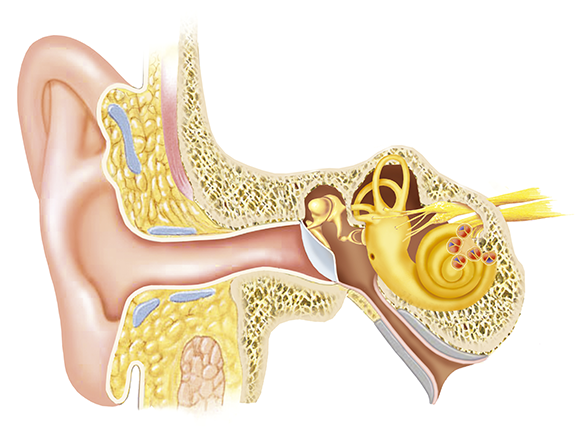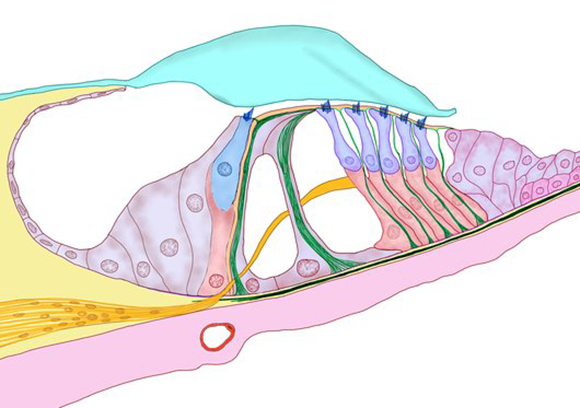People who suffer from tinnitus perceive whistling and ringing sounds without any discernible external source. The condition is relatively common, affecting approximately 15% of the population. The risk of developing tinnitus increases with age and while mild tinnitus is relatively common, severe tinnitus that negatively affects one's quality of life is less frequent.
Read more:
Tinnitus can manifest in individuals with hearing impairments, injuries, head traumas, infections, and surprisingly even in individuals who are deaf and unable to hear sounds from their environment.
Persistent tinnitus can lead to sleep disturbances, anxiety, and depression, and a decrease in quality of life. While certain devices can emit sounds that alleviate tinnitus, and psychological treatments can aid in coping with the condition, unfortunately, there are currently no effective medical treatments available to fully alleviate the suffering of those affected by tinnitus.
How Hearing Works
The sense of hearing relies on our ears' ability to capture sound waves, translate them into electrical signals, and transmit these signals to the brain for interpretation. The outer part of the ear, the auricle, captures the sound waves and channels them through the canal to the eardrum – a tissue that vibrates in response to sound waves. The cochlea, the auditory organ in the inner ear, called thus due to its shape, captures these vibrations and translates them into electrical signals that the auditory nerve then transmits to the brain.
2 View gallery


The sense of hearing is based on the ear's ability to capture sound waves, translate them into electrical signals, and transmit them to the brain. Structure of the ear
(Illustration: Shutterstock)
To date, the root cause of tinnitus has yet to be identified, and this lack of knowledge, among other things, hampers the development of medical solutions to the problem. One long standing hypothesis suggests that damage to the neural activity of the cochlea causes tinnitus. This damage supposedly leads to the brain receiving inaccurate signals from the ears, prompting it to increase its activity in compensation. The problem with this hypothesis is that until now, in some individuals suffering from tinnitus, no significant impairment in hearing ability has been identified. In a recent study researchers conducted comprehensive tests on individuals with normal hearing, examined the function of many auditory systems involved in hearing, and for the first time provided substantial support to this hypothesis.
Exploring the Root Couse of Tinnitus
Audiometric testing, a standard procedure for assessing hearing in adults, involves subjects listening to sounds of varying intensities and frequencies in each ear separately and reporting their perceptions. This test helps to identify hearing issues and determine their origin. In the new study, researchers aimed to uncover potential nerve damage not detectable by conventional hearing tests. This involved assessing the functionality of various components within the hearing system, even when no obvious impairments were observed in the initial audiometric evaluation.
The study enlisted approximately 300 participants aged 18 to 72, all with clinically normal hearing. Participants were asked to describe their experiences with tinnitus, including its duration and intensity. About 200 subjects reported experiencing brief episodes of tinnitus, lasting less than a minute. The remainder reported longer episodes of tinnitus, with some experiencing it intermittently, often triggered by loud noises or certain medications. Notably, 29 participants reported enduring chronic tinnitus for six months or more.
2 View gallery


Damage to the activity of the cochlear nerve (orange) may contribute to tinnitus. Corti's organ within the cochlea: Hair cells (blue) respond to sound wave vibrations by transmitting a nerve signal
(Illustration: Bo Veisland / Science Photo Library)
Noise and Ringing
The researchers posited that auditory nerve damage plays a pivotal role in the onset of tinnitus, and that even in people with normal hearing, the severity of tinnitus is related to such damages. To explore this, they meticulously analyzed the integrity of the subjects' hearing systems, examining the various stages of sound processing from the moment it is captured by the ear until it reaches the brain.This comprehensive approach was designed to pinpoint any nerve damage that might facilitate the transmission of sound from the ear to the brain, as well as to assess the brain's own response to these signals.
The researchers discovered that individuals with normal hearing who experience tinnitus do indeed exhibit nerve damage within the auditory system. Such damage includes abnormal reflex activity of the inner ear muscles and diminished activity in the cochlear nerve, responsible for transmitting auditory signals from the inner ear to the brain. Additionally, the severity of the reported tinnitus by the participants correlated with the extent of damage identified in the tests.
The researchers also examined the activity of the area in the brain that processes auditory information and discovered that subjects suffering from tinnitus have excessive activity that reflects the unreal sound they hear. The hypothesis was strengthened: damage to the nerves in the hearing system, leading to faulty activation of areas in the brain linked to auditory analysis, encourages the development of tinnitus.
As of now, there exists no definitive cure for tinnitus, underscoring the importance of research efforts similar to the described study to uncover the underlying causes of the condition. Identifying the mechanisms at play offers hope for future interventions aimed at mitigating tinnitus severity, potentially through treatments targeting nerve damage. A promising avenue for such treatments involves neurotrophins, a class of proteins capable of aiding the repair of damaged nerves. One such protein, Neurotrophin-3 (Ntf-3) has demonstrated potential in promoting the regeneration of the cochlear nerve in animal models. The anticipation is that these findings could pave the way for therapeutic strategies that restore neural function, decrease aberrant brain activity, and ultimately improve the quality of life for individuals afflicted with tinnitus.

